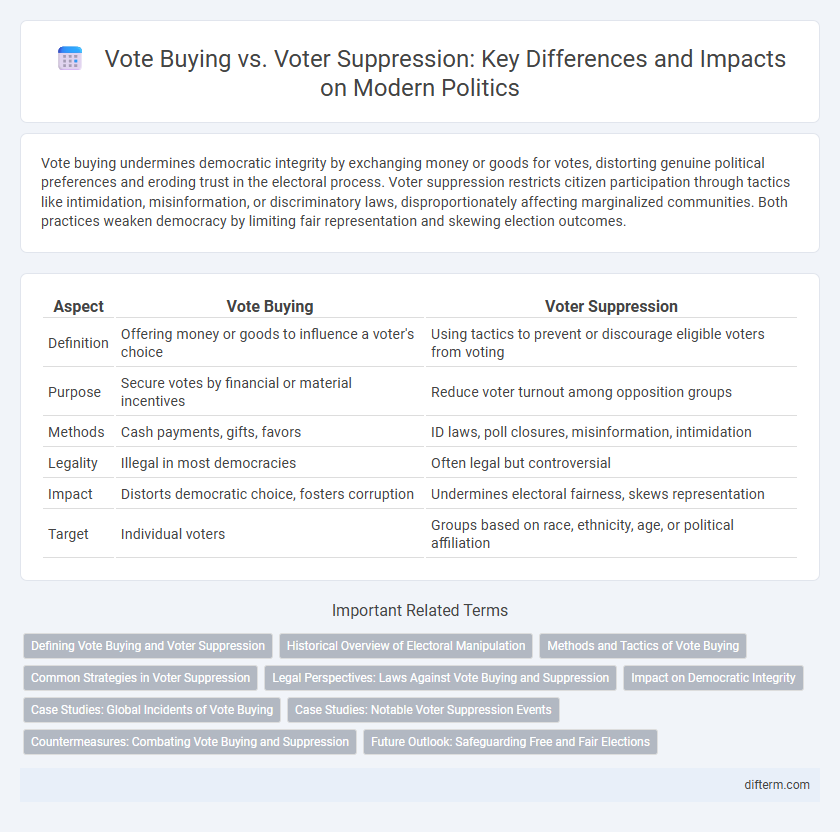Vote buying undermines democratic integrity by exchanging money or goods for votes, distorting genuine political preferences and eroding trust in the electoral process. Voter suppression restricts citizen participation through tactics like intimidation, misinformation, or discriminatory laws, disproportionately affecting marginalized communities. Both practices weaken democracy by limiting fair representation and skewing election outcomes.
Table of Comparison
| Aspect | Vote Buying | Voter Suppression |
|---|---|---|
| Definition | Offering money or goods to influence a voter's choice | Using tactics to prevent or discourage eligible voters from voting |
| Purpose | Secure votes by financial or material incentives | Reduce voter turnout among opposition groups |
| Methods | Cash payments, gifts, favors | ID laws, poll closures, misinformation, intimidation |
| Legality | Illegal in most democracies | Often legal but controversial |
| Impact | Distorts democratic choice, fosters corruption | Undermines electoral fairness, skews representation |
| Target | Individual voters | Groups based on race, ethnicity, age, or political affiliation |
Defining Vote Buying and Voter Suppression
Vote buying involves offering money, goods, or services to voters in exchange for their electoral support, undermining the fairness of democratic processes. Voter suppression encompasses tactics like strict ID laws, purging voter rolls, and limiting polling access, designed to deter or prevent eligible voters from casting ballots. Both practices distort electoral integrity by either coercing voter choice or restricting voter participation.
Historical Overview of Electoral Manipulation
Historical electoral manipulation reveals persistent tactics like vote buying, where candidates offered money or goods to secure ballots, contrasting with voter suppression methods aimed at disenfranchising specific groups through poll taxes, literacy tests, or intimidation. In the United States, practices such as the Jim Crow laws institutionalized voter suppression, systematically marginalizing African American voters during the late 19th and 20th centuries. Globally, both vote buying and suppression have undermined democratic processes by distorting popular will and weakening electoral integrity throughout history.
Methods and Tactics of Vote Buying
Vote buying involves offering money, goods, or services to voters in exchange for their electoral support, often executed through direct cash payments, food distribution, or the provision of favors. Tactics include mobilizing local intermediaries, such as community leaders or brokers, to identify and persuade targeted voter groups, leveraging social networks to ensure compliance and limit detection. This method undermines democratic processes by commodifying votes and creating unequal electoral influence, contrasting with voter suppression tactics aimed at disenfranchisement.
Common Strategies in Voter Suppression
Common strategies in voter suppression include strict voter ID laws, purging voter rolls, limiting early voting periods, and closing polling stations in historically marginalized communities. These tactics disproportionately affect minority groups, reducing their electoral participation and skewing election outcomes. Legal challenges and advocacy efforts aim to counteract these measures to ensure equitable voting access.
Legal Perspectives: Laws Against Vote Buying and Suppression
Laws against vote buying criminalize the exchange of money or goods for votes to ensure electoral integrity, with strict penalties in jurisdictions like the United States under the Voting Rights Act and state election codes. Voter suppression, through tactics such as restrictive ID laws or purging voter rolls, faces legal scrutiny under federal laws including the Help America Vote Act and court rulings that protect voting rights. Both practices undermine democratic principles and are subject to ongoing legal challenges to preserve fair access to the ballot.
Impact on Democratic Integrity
Vote buying undermines democratic integrity by corrupting the electoral process and skewing representation toward those who can afford to manipulate voters financially. Voter suppression erodes democracy by systematically disenfranchising marginalized groups, leading to unequal participation and distorted election outcomes. Both practices degrade public trust and weaken the legitimacy of democratic institutions.
Case Studies: Global Incidents of Vote Buying
Global incidents of vote buying reveal systematic efforts to manipulate electoral outcomes by offering money or goods in exchange for votes, significantly undermining democratic processes in countries like Nigeria, the Philippines, and India. Case studies expose how vote buying distorts political representation by marginalizing genuine voter preference and incentivizing corrupt political practices. These cases highlight the urgent need for electoral reforms that enhance transparency, accountability, and voter education to combat vote buying and protect electoral integrity.
Case Studies: Notable Voter Suppression Events
Notable voter suppression events include the 2018 Georgia gubernatorial election, where restrictive voter ID laws and purging of voter rolls disproportionately affected minority communities, resulting in significant legal challenges. The 2013 Supreme Court ruling in Shelby County v. Holder weakened the Voting Rights Act, leading to a surge in state-level suppression tactics such as polling place closures and stringent ID requirements in Alabama and North Carolina. Case studies reveal that these suppression methods often target marginalized populations to influence election outcomes, contrasting with vote buying, which involves direct incentives for individual votes rather than systemic barriers to participation.
Countermeasures: Combating Vote Buying and Suppression
Effective countermeasures against vote buying include stringent enforcement of electoral laws, transparent campaign financing, and voter education programs highlighting the legal and ethical implications of vote purchasing. Combating voter suppression involves expanding access to voting through measures such as extended polling hours, mail-in ballots, and robust legal challenges against discriminatory practices like voter ID laws and purging of voter rolls. Election monitoring organizations and technology-driven voter registration systems also play a critical role in safeguarding electoral integrity and ensuring equitable participation.
Future Outlook: Safeguarding Free and Fair Elections
Vote buying and voter suppression remain critical threats to democratic integrity, necessitating robust legal frameworks and vigilant enforcement to safeguard free and fair elections. Emerging technologies like blockchain voting systems and biometric verification promise to enhance transparency and reduce fraud, while civic education campaigns play a vital role in empowering voters to resist coercion and intimidation. Strengthening independent electoral commissions and promoting international election observation further ensure accountability and bolster public trust in electoral outcomes.
Vote buying vs Voter suppression Infographic

 difterm.com
difterm.com